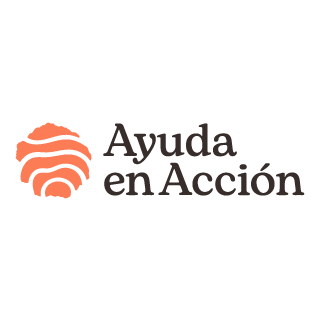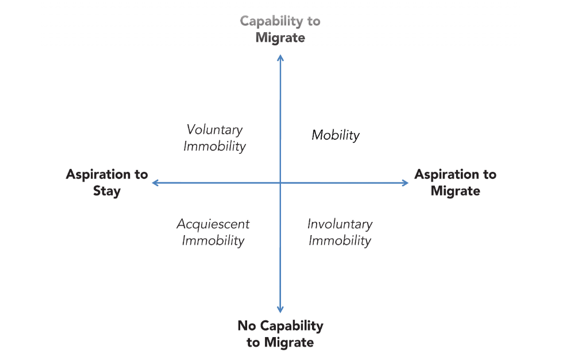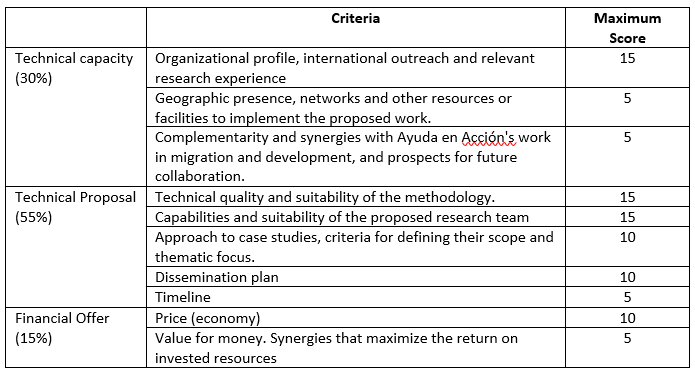

 Location: Madrid (Spain)
Location: Madrid (Spain) Contract: Contractor/Freelance
Contract: Contractor/Freelance Working day: Full time
Working day: Full time Sector: NGOs and public sector
Sector: NGOs and public sector Vacancies: 1
Vacancies: 1 Discipline: Other
Discipline: Other Work modality: Remote
Work modality: RemoteGlobal Study on Immobility: Case Studies from Africa and Latin America
Introduction
Ayuda en Acción (AeA) is an international NGO that fights the causes and consequences of poverty and inequality around the world. Throughout 19 countries across Latin America, Africa and Europe, we work to generate opportunities so that young people can have a better future.
We have been working for more than 40 years with long-term programs, supporting thousands of vulnerable people, mainly women, in key stages of their lives (childhood and adolescence).
We act in areas affected by climate change, conflict and poverty, responding to the most basic needs with a long-term vision, and seeking solutions to prolonged crises. We work to ensure safe, equitable and prosperous environments in which communities have the most favorable conditions for their own development, whereby migration is a free and informed choice.
Our human rights-based approach to migration and development is based in four components:
Address structural factors
We work to mitigate the adverse drivers and structural factors that hinder people from living in dignity in their place of origin, violating their right to remain. We help vulnerable communities to develop adaptation and resilience strategies to cope with the impact of climate change and environmental degradation, and promote sustainable livelihoods. We also foster local economic development and decent jobs, and promote inclusive governance and social cohesion.
Socio-economic inclusion
We support socioeconomic inclusion of migrants, refugees, IDPs, returnees and host communities by promoting access to protection, education, and training, as well as decent employment and entrepreneurship opportunities. We work to promote inclusive market systems that favour the integration of migrants and refugees.
Fight against racism and discrimination
We work with schools, local media, public authorities, local CSOs and the private sector in building positive public narratives, discourse and attitudes towards migration and human mobility.
Humanitarian action and protection
We promote a safe migration and mobility for refugees, migrants and internally displaced persons under a human rights-based and a gender-responsive approach. Along the migration corridors, we provide basic humanitarian aid, including legal assistance and psychosocial support.
Background
In February 2022, AeA’s Honduras Country Office published the study "Migrations: Study on livelihoods and psychosocial factors that strengthen rootedness". The study used an approach that shifted the way we look at human mobility. While everyone was wondering about the "adverse drivers” and "root causes of migration", the study aimed to investigate the dynamics that generated “rootedness” in the territory. In this sense, although not explicitly, it contributed elements of complexity to the simplistic debate, on development cooperation as a policy to deter migration.
Based on this background, and with the intention of broadening the knowledge about the populations that remain (intentionally or unintentionally) in their place of origin, Ayuda en Acción considers very relevant to delve deeper into this topic. We seek to learn from different realities and cultures, and generate knowledge and evidence that will improve our interventions and contribute to our positioning as an international NGO. Therefore, we proposed a study based on a compilation of case studies of Ayuda en Acción intervention countries in Latin America and Africa.
Objetives:
The overall objective of the study is to generate comparative evidence on the factors that, in contexts of human mobility, lead people to remain in their places of origin. Such evidence shall strengthen the design and implementation of our programs on human mobility, development and humanitarian action, as well as for our positioning in the development community as an NGO with a high level of knowledge and operational capacity[1].
As specific objectives, we expect the following:
This is an exploratory study, which does not seek to establish categorical conclusions about the dynamics that lead a community to be more prone to migration or to remain in its territory. The study seeks to offer examples of the dynamics of immobility in very specific contexts, illustrating the complexity and diversity of this drive, in order to add elements for a better design of projects, programs and policies with a focus on rights and sustainable development.
Profile of the Research Organization and Eligibility
We seek to collaborate with a research organization (hereinafter “the applicant”) with extensive experience in producing studies on issues related to migration and development: public or private universities, think tanks, research centres, foundations or public intergovernmental entities whose purposes include research. Private companies within the consulting sector are excluded from this call for proposals.
It is expected that the applicant has the capabilities to develop research within the geographic scope proposed herein, including the constitution of teams appropriate to the linguistic and cultural diversity of the countries included in the study. The geographical presence, links to networks, and the history of collaboration with civil society will also be an asset.
It is desirable that the applicant has a deep interest in the subject of migration and development, and specifically in the subject of immobilities. Although the collaboration is limited to the services provided within the framework of this research, we expect an interest in collaborating in the dissemination of this research and the possibility of collaborating in similar initiatives in the future.
Conceptual and methodological framework
Our study on “root factors” was certainly a fresh perspective that strengthened our discourse in a context where the so called “root causes of migration” was dominant. It also helped Ayuda en Acción make a clear connection between human mobility and our development work. However, the idea was not new. In the academia, several scholars had developed fruitful research and conceptualization around the term “immobility”. Our idea of “rootedness” was actually equivalent to “voluntary immobility”.
The proposed study seeks to explore other forms of immobility, taking as a reference the theoretical framework proposed by Kerilyn Schewel and her aspiration-capability framework[2].

As this figure illustrates, this framework results in “three types of immobility: involuntary, voluntary, and acquiescent. Involuntary immobility refers to those who aspire to migrate but are unable to do so. Voluntary immobility refers to those who have the capability to migrate, but who aspire to stay where they are. The term acquiescent immobility describes those who do not wish to migrate and are unable to migrate […] it shows that immobility can result from motivations to stay in place, from constraints on mobility, and/or from the interaction of the two over time”.
We also consider useful the terms “contexts of forced migration” or “culture of migration” in identifying the locations, situations (long lasting or sporadic) and population groups that are to be the focus of this study. Despite of the strength of the drivers for migration, many remain involuntarily or voluntarily immobile. Within this framework, through the case studies of this research, we seek to understand how immobility occur in different settings in the global south, with the greatest diversity in terms of contexts, “culture of migration”, severity of climate change impacts, levels of poverty and inequality, diaspora’s role (remittances, etc.), violence, cultural backgrounds, etc. For the purpose of this research, we will call this “thematic focus”.
Finally, we would like to point out some insights to help the applicant understand why this framework is relevant for Ayuda en Acción:
Regarding the methodology, we expect proposals to include research questions and hypotheses, with the understanding that these will be preliminary and general. The definition of these will be carried out in the "scoping and methodological design" phase.
In principle, we believe that a mixed methods approach would be the most appropriate way to approach the study. Some quantitative data (primary or secondary) should facilitate the characterization of the contexts and populations, while qualitative information is an input to understand in depth the experiences of the people from selected communities and the insights of some key informants. In any case, the proposal shall recommend the methodological options considered best suited to the objectives of the study.
Scope
The comparative and exploratory nature of the study requires a certain diversity in the selection of case studies. Therefore, the territorial scope would include diverse geographies and socio-cultural realities of the Global South in order to ensure the possibility of a comparative analysis. In principle, case studies are considered in a selection of countries (and zones within the countries) where AeA is present, although not in all cases they need to be carried out in regions or communities where AeA is implementing a project.
The thematic scope of the study would have two dimensions. The first one has to do with the types of immobility included in the aspiration-capability framework. We expect the case studies to address the three types of immobility, with the cases of voluntary and forced immobility being of greatest interest, and the case of acquiescent immobility at a lower level of priority.
The second dimension is related to the "thematic focus" mentioned above. This focus is comprised of the characteristics of the locations and populations selected for the research, including the "culture of migration", severity of climate change impacts, levels of poverty and inequality, diaspora's role, violence, cultural backgrounds, etc. This thematic scope would give greater appeal to a compilation of case studies that share a common conceptual and methodological core, but at the same time present a great diversity. The thematic focus suggested in the upcoming sections are preliminary and should be considered as the starting point of a discussion whereby we expect the research team to challenge our initial ideas.
The following is a brief description of the countries that would make up the case studies, indicating the type of work Ayuda en Acción carries out and their location.
Ecuador:
We have projects related to Migration in Ibarra and Guayaquil, as well as development projects in rural areas of Azuay, Carchi and Imbabura (water management and resilient agriculture) and Esmeraldas (cocoa). In Esmeraldas, Chota Mira, Pucayacu and Pukará, we work on protection against gender-based violence.
Ecuador has an important migratory tradition, both as a country of origin and currently as a transit and destination country due to the Venezuelan crisis. Recently, there has been a significant increase in the number of Ecuadorians taking the Darien route. The deterioration of security conditions could increase migratory flows, both to the US and Europe, potentially increasing deportation. As a possible thematic focus, the impact of the deteriorating security situation on migration/permanence decisions could be assessed, not only for the Ecuadorian population but also for the Venezuelan population settled in the country.
Colombia
We have projects in urban Cali (youth and peace-building), Caribbean region (value chain projects, and gender and culture of peace in rural areas of Bolivar and Sucre), Nariño (cocoa with Afro-descendants and peasants), Santander and Norte de Santander (attention to Venezuelan migrant population); Catatumbo (peace-building); and Guajira (water with Wayuu population).
The country experiences significant migratory flows of origin, destination (Venezuelans) and transit (Darien route, and to the south) as well as forced internal displacement. In 2022, the country had a negative migratory balance, losing population despite continuing to receive migrants.
A possible thematic focus could be the economic inclusion of youth and/or social cohesion.
Mexico
In Sierra Nevada (Puebla), Yautepec, Mixteca, Tapachula (Chiapas) and Veracruz, Ayuda en Acción works on climate change resilience (water, food security and energy). In Cañadas, Yautepec, Sierra Nevada, Costa, Soconusco and High Mountains, and San Luis Potosi, we work on economic inclusion (value chains, employment and entrepreneurship). Our programs for migrants and refugees are located in Tapachula, Palenque (Chiapas), Tenosique (Tabasco) and Ciudad Juarez (Chihuahua).
The downturn of the coffee sector in Soconusco[4] would be of interest, as this area has a long migration history.
Mexico is a country of origin, transit, destination and return, in addition to suffering a dynamic of forced internal displacement.
The thematic focus in Mexico could be climate resilience.
Mali
We work mainly in Segou (food security, cereal value chains, employability), but there is a notable interest in areas of strong migration culture and links with the diaspora. In particular Kaye and Sikasso.
The country generates a very significant flow to Europe, partly due to the impact of climate change. Its situation of fragility, internal displacement, and internal cultural diversity make Mali an interesting case study. As possible thematic focus, we could consider the active role of the Diaspora (especially in France) and remittances in local development.
The most common language is Bambara, and French may be used for interviews with people from the cities with a higher socio-cultural level (e.g. civil servants, NGO workers, traders, etc.).
Mozambique
We work in the province of Cabo Delgado (our office is in Pemba), with humanitarian programs to assist internally displaced persons. We also work on socioeconomic inclusion with both populations (host communities and IDPs).
This could be a paradigmatic case due to the centrality of forced internal displacement in the north of the country (Cabo Delgado). In the south (Maputo province), migration to South Africa and Swaziland is common, with people migrating both on a seasonal and permanent basis. There is an intense of cross-border trade and transnational families are common. In both cases, there is rural-urban internal migration.
The thematic focus may be around internal conflict (north) or cross-border economies (south).
In terms of language, the case is similar to Mali, with local languages and Portuguese.
Honduras
Honduras has had a significant flow in recent years to Mexico and the USA, and to a lesser extent to El Salvador. It is also a recipient country of forced returnees and deportation from Mexico and the USA.
Important note: Honduras will develop its case study independently with a local university. During the scoping and methodological design phase, the research team will have access to the methodological documents of the Honduras study. Together, we will assess the convenience of taking ideas and methodological tools from this study, as well as the inclusion of this case study in the final report. If the Honduran case study is to be included, the time allocation from the research team will be minimal.
Division of labor and logistical issues
The research team will be in charge of the methodological design, data processing (cleaning, transcriptions when needed, coding, etc.), data analysis, and report writing.
Ayuda en Acción country teams will be in charge of data collection in the field. If appropriate, Ayuda en Acción may outsource this function to local partners or a service provider. The research team is expected to ensure that the data collection teams are adequately trained in the application of the information collection tools.
The drafting of the report will rest with the research team. We consider that the section “Recommendations” will be drafted in a collaborative manner. In this sense, Ayuda en Acción will appear as co-author of the report.
A group of relevant AeA staff will be created in order to provide feedback, discuss the deliverables and offer support to the research team.
Structure of the report
We expect a global report[5], based on the compilation of the different case studies (each would be a chapter). Although the main deliverable is a single global study, each case study should be structured in such a way that it can be presented as a stand-alone publication (with minor adjustments in editing by Ayuda en Acción[6]). The general sections of the overall study should also be designed in such a way that, with minor adjustments, they can be used to generate stand-alone publications at the country level.
The main report would have four blocks presenting i) the justification and methodology of the study; ii) the case studies (one chapter for each); iii) the comparative analysis; and iv) the conclusions and recommendations. A "prologue" or introduction presented by a renowned academic could also be of interest.
In any case, proponents may suggest alternative structures in their proposals that improve on the above.
Study Phases
Five phases are foreseen for carrying out the study:
Scoping and methodological design
During this phase, the research team will carry out the necessary research, document review and consultations to obtain a vision of the context of the selected countries and propose a duly justified selection of case studies. To this end, Ayuda en Acción teams will provide the necessary information and feedback through documents and meetings.
Similarly, the methodology will be developed, including research questions, hypotheses, variables, analysis strategies, tools for information collection and guidance to the field teams, etc. Ayuda en Acción will facilitate contact with key informants. As a result, a report summarizing the above is expected.
Field work:
With regard to the fieldwork, the research team will:
The applicant will explain in the technical proposal how the research team will engage with data collection teams in order to ensure that fieldwork is implemented rigorously. This may include training (online or in-person), pilots, guidance documents, feedback meetings, etc.
Preparation and analysis of the information:
With the information provided by the field teams, the research team will carry out all the necessary tasks to prepare the data and analyze it.
Report writing.
The team will write the reports in English, according to the indications in the "report structure" section or possible modifications agreed between the parties. Ayuda en Acción will carry out the respective quality reviews and give feedback to the research team. Peer reviews that may be proposed will also be considered.
Dissemination.
The lead researcher is expected to be available for dissemination of the study in different forums (which may include travelling). Applicant entities are expected to suggest forums or events (ideally, outside the strictly academic field) in which to present the report, so the study reaches the widest possible audiences. At least three presentations of the report should be foreseen in the proposal. If these are face-to-face, Ayuda en Acción will cover the travel expenses associated with them.
It is also expected that the research organization publishes the report in its website and use its social media to make it public.
Intellectual property, use of data and dissemination
The study and the data will be the property of Ayuda en Acción, which will be co-author of the study together with the researcher. The data collected may be used by the research team for strictly academic publications (e.g., academic journals), subject to prior communication and agreement with Ayuda en Acción, and mentioning our organization in the respective publication. The use of such data in new articles or reports aimed at the general public or the development/humanitarian community will not be allowed, unless agreed between the parties (if possible, within the framework of a genuine collaboration between the parties).
The report, as edited by Ayuda en Acción, may be disseminated without restriction and its contents may be cited in other publications according to internationally accepted citation standards.
The research organization is expected to collaborate in the dissemination of the study in forums, congresses and events in the field of migration and development cooperation, particularly at regional and international level. Specific proposals to achieve such dissemination will be positively valued, especially if the applicant has a track record in this regard (technical capacity section in the proposal).
Budget and payments schedule
The estimated budget for the study is 40,000 euros.
The following items should be included in the above-mentioned budget:
Payment shall be made by bank transfer in three instalments within thirty (30) days from the receipt of each invoice, as follows:
Timeline
Proposals shall include a schedule of activities following the phases described in section 9. Ideally, the final report should be produced by the end of October (2024) or early November.
Content of proposals
Proposals should be no longer than 10 pages (excluding CVs and other attachments) and should contain the following information:
Evaluation of Proposals
Proposals will be evaluated by an evaluation panel composed of Ayuda en Acción staff at HQ, regional and country level offices.
The following criteria will be used:

Submission of proposals and deadline
The technical and financial proposals must be submitted through our procurement platform Talent Clue.
The proposals must be written in English, and should be in pdf format.
The deadline for submitting a proposal is 20 February at 23:59 CET.
Interested applicants can also send questions to the following emails:
Code of conduct, no discrimination, and protection from Sexual Exploitation and Abuse (PSEA).
In order to ensure environments free from sexual exploitation and abuse the supplier shall:
At Ayuda en Acción we have zero tolerance for behavior related to sexual exploitation, sexual abuse and/or sexual harassment, therefore, in accordance with our Child Protection Policy, we are committed to carry out a series of checks prior to signing a contract with the selected applicant. Therefore, by submitting this application, the applicant accepts and authorizes Ayuda en Acción to performance such checks in order to continue in the selection process.
All selection processes will take into account the criteria of NO discrimination based on sex, race, skin colour, religion, political ideas, social origin, sexual orientation, age, etc., providing a transparent process and equal opportunities for all candidates, as stated in our Code of Conduct.
Finally, before signing the contract, the selected applicant shall fill in and sign the Supplier’s Questionnaire (Annex III) certifying that they are not in any of the exclusion criteria listed in section c) of the Questionnaire. Applicants that fall under one of the exclusion criteria will not be eligible to sign a contract with Ayuda en Acción.
Annexes - To download the annexes, please click on the link - ANNEXES.
Annex I. Human mobility portfolio.
Annex II: Code of conduct
Annex III: Supplier’s Questionnaire (exclusion criteria)
[1] A description of these programs can be found in Annex 1 of these terms of reference.
[2] An article describing the framework can be consulted at https://mixedmigration.org/articles/staying-put-why-its-time-to-pay-more-attention-to-mixed-immobility/. Also see: https://journals.sagepub.com/doi/10.1177/0197918319831952
[3] In some cases, we may consider locations where Ayuda en Acción is exploring future work.
[4] Soconusco in one of the main receiving communities in Mexico, with second and third generation communities from Guatemala, as well as seasonal workers.
[5] The length of the report could be around 80-90 pages (excluding bibliography).
[6] For example, an "introduction" could be composed for the stand-alone case studies, taking excerpts from the introduction of the global report that omits references to the other case studies. In turn, the case studies in the global report could omit some information to avoid making the report too long. Such information, rather than being discarded, could be used in the case reports.
[7] According to Ayuda en Acción travel policy, business class flights are not covered.